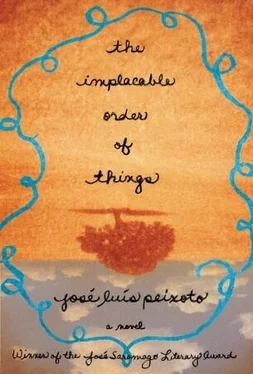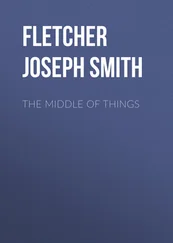THE HAMMER IN SALOMÃO’S HAND began to tremble. On the street the devil, almost leaning against the wall, kept smiling. And Salomão struck the wall with the hammer half a dozen times, since that was how many times it took to make the right-sized hole for the window. And not one piece of rubble hit the devil, nor did one speck of dust disrupt the perfect harmony of his clean shirt, his pleated trousers, and his smile. Standing there balancing the hammer, with his left hand grasping the handle and his right hand near the head, Salomão gazed at the devil. With the visor of his cap sticking out from between the dull tips of his horns, casting a shadow so small it didn’t cover his eyes, the devil smiled and gazed at Salomão. And everything he said, and that Salomão understood, wasn’t in words. Everything he said was in that steady gaze, in that tempting smile. That fixed gaze full of hazy shapes, ripping through Salomão and rummaging inside him. That smile telling him, through vaguely curved lips, through an imperceptible and obvious grimace, your wife is cheating on you; when you look and think you know what she’s thinking, you don’t know what she’s thinking, you don’t know who you’re looking at; your wife is cheating on you and you’re alone, deceived, and everyone’s laughing at you. Salomão lowered his eyes and saw his wife walking through the kitchen, he remembered and envisioned his wife walking through the kitchen, he looking at her and she being different. When Salomão raised his head, he saw the devil going away, but his smile and gaze were still in front of him, inside him. Master Rafael and the apprentice arrived with the window. As if he were still in a daze, Salomão held the chisel and hit it with the carpenter’s hammer to make the hole match the lines. Master Rafael and the apprentice began to anchor the window in the wall. Salomão apologized and said he had to leave. Master Rafael told him to have a glass of red wine and called the blind prostitute. Salomão no longer heard. The blind prostitute entered the kitchen without knowing or guessing why they’d called her. Master Rafael leaned out the window and saw Salomão disappearing down the street.
THIS IS THE ROAD THAT PULLS AND DESTROYS ME. The ultimate and only road. This path that isn’t a road. This sky that doesn’t bring silence but that screams it when the silence is unbearable. I think: perhaps I’m no longer this body I’ve become, perhaps I’m no longer this form inside this body, perhaps I’m already my dead self just suffering, with no will left, just waiting for unarriving death. And yet, on this cadaverous afternoon that unites and divides the world, I pass through something that I am and know. I’m moving toward you, Salomão. In your steps and in mine, I’m coming closer. And the weariness that seizes me frees me in my duty to keep going. Salomão. Your eyes.
WHEN THEY SAW AND RECOGNIZED EACH OTHER, the distance separating Salomão from the town was the same distance that separated José from the Mount of Olives, and neither one hastened his step. At the same speed, neither fast nor slow, they steadily walked, as if they saw only each other, as if they didn’t see each other. They kept drawing nearer. The sun guided them along the same straight line. The stubble covering the wheat fields observed them. The cork on the cork trees stopped growing. Their features, dim and abstract in the distance, came into focus at the same time, for José as for Salomão. Neither carefree nor solemn, their faces were of two men looking at each other as if for the first time but without surprise or curiosity or useless words. They stopped. They were separated by exactly two steps: one belonging to José and the other to Salomão: exactly two steps. The two steps separating them were too small to prevent either one from imagining himself inside the other, from seeing himself with the eyes that weren’t his and through which he saw. And in a fraction of the instant in which the world also stopped, Salomão looked at José, or José looked at himself. And in that silent gaze, larger and more forceful than a thousand words explaining each word of a thousand words, José spoke to himself, or Salomão spoke to him. He said it’s not true, is it? And within himself, or within Salomão, José heard the question endlessly echo for a moment. José, or Salomão, lowered his eyes. Separated from each other once more, still in silence, Salomão almost smiled. They turned their backs to each other and drew away. Salomão reached the town before José reached the farmstead.
THE RICH PEOPLE’S HOUSE REMAINS. Empty. And full of what once was sincere hope and today is my dead gaze. The sheepdog sees me walk by without stirring. The yard is the same once I’ve passed it. The garden, small and yellow and hearty, doesn’t feel me. I touch a gatepost of the pen, and the sheep look at me from the sleepy distance of their almost closed eyes. Behind the feed troughs, I take off my shirt. I grab the rope. I wind it around my fist. I hear it whistle. Like a sparrow. Like a sparrow whistling like a breeze blowing like a sparrow in spring. I switch hands. I hear it for a long time. A very long time. I put on my shirt. I go into the house. I look straight at the sun. I’m tired. I’m going to rest.
IT WAS ONE OF MY WORK DAYS at the Mount of Olives, and in spite of Master Rafael’s wedding, I didn’t want to miss, as I’ve never wanted and never missed. Old Gabriel had told me the previous day it’s all right if you don’t come tomorrow, and he was the one who paid me, for he had been the steward ever since José’s father had died. If this post didn’t bring him any benefit, it also didn’t require much work. He didn’t have to contract laborers for the cork or the olives, nor did he need to hire migrants for the harvest, since for thirty years they were the same, working at the same pace, working up the same dull sweat; and when a worker happened to die, his son would take his place the following season. Nor did old Gabriel have to keep any accounts, since for thirty years the same men would come on the same days to buy the same quantities of cork, the same amounts of wheat and olives, paying the same price as in previous years, and they’d return with the same measures of flour and olive oil, which were kept in the pantry in case the sons of Doctor Mateus showed up at the farmstead. And every year the vessels of old olive oil were poured out and filled with new oil, and every year the still-unopened sacks of old flour were replaced by sacks of new flour. It’s all right if you don’t come tomorrow, old Gabriel told me. But I had to go, as I’ll always go, every other day, for the rest of my life.
That morning I’d already prepared the bath for Salomão and for my mother, I’d already dressed my mother, and now I was ironing Salomão’s white shirt to take out the creases and the smell of moths, which came from its having lain in storage, while he pranced around the house barefoot, in his long johns and undershirt. He chewed on mint leaves and talked out loud. With a sprig of basil behind his ear, he said Master Rafael this, Master Rafael that. And he walked by me putting the chairs in place that were already in place, he washed his hands in the sink, nervous as if he were the groom, more nervous than if he were the groom. I put down the iron, and he came over and started dressing. All according to a strict order: after his underwear, then his socks, since they would be covered by his trousers; then his shirt, since it would go inside his trousers and under his coat; then his trousers and belt over his straightened shirttail and his smoothed long johns; then his shoes; then his coat. And this natural, logical order was only followed by Salomão on special days like that one, when he suddenly acted as if he were rich, as if every day he wore a fancy coat and had nothing to worry about except his daily and logical ritual of putting his clothes on in the right order, this being a distinguishing feature of his elegance and refinement. And while Salomão leisurely inserted an arm into one of his shirt sleeves, feeling its delicate warmth and pure white softness, leisurely imagining lands and estates, I crouched in a corner. I stuck a hand inside one shoe, spread a glob of polish on the toe, and vigorously rubbed with a cloth. While doing the other shoe I looked right at him, with no risk of being noticed, since he was buttoning his shirt with his head tilted back and his eyes closed. His shiny black shoes were in front of me, and I waited for him to finish tightening his belt. He slowly, aristocratically, pinched and lifted his trousers, sat down in a chair, and extended his feet. I loosened the shoestring of the right shoe and tried to slip it on, but it was very tight. I fetched the shoehorn. I wedged it between his heel and the shoe. I tried with all my might. I tried with all my might. I think I turned red. I couldn’t do it. It was very tight. I stopped to think and Salomão, back from the wealthy lands and estates he’d imagined, pointed to the toolbox. I rummaged through it and found his carpenter’s hammer. I put the shoehorn back in place, and hammered three or four times on the heel. I did the same thing for the other shoe. Salomão stood up and walked with comical footsteps to where his coat was. He put it on and no longer imagined himself wealthy and elegant, so painfully did his tight shoes rivet him in reality.
Читать дальше












